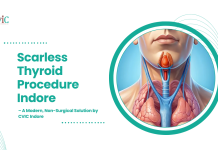Thyroid Goiter is a common thyroid disorder characterized by the enlargement of the thyroid gland. This condition can affect anyone, but it’s particularly prevalent in regions where iodine deficiency is common. Renowned specialists like Dr. Shailesh Gupta, Dr. Alok Kumar Udiya, and Dr. Nishant Bhargava from CVIC Indore have been successfully diagnosing and treating Thyroid Goiter for years. In this blog, we’ll explore the top 10 causes, symptoms, and effective treatment options for Thyroid Goiter.
Understanding Thyroid Goiter
Thyroid Goiter occurs when the thyroid gland, located at the base of the neck, enlarges abnormally. While many cases are harmless, some may signal underlying thyroid issues such as hyperthyroidism, hypothyroidism, or even thyroid cancer.
Also Read: What Kind of Doctor Treats Diabetic Foot Pain?

Top 10 Causes of Thyroid Goiter
Iodine Deficiency
Iodine deficiency is one of the most prevalent causes of Thyroid Goiter worldwide. The thyroid gland needs iodine to produce thyroid hormones, and a lack of it forces the gland to enlarge to compensate.
Graves’ Disease
This autoimmune disorder triggers an overproduction of thyroid hormones, causing the gland to swell. Dr. Shailesh Gupta notes that this condition is particularly common among women.
Hashimoto’s Thyroiditis
An autoimmune condition where the immune system attacks the thyroid gland, causing inflammation and enlargement. Experts like Dr. Alok Kumar Udiya at CVIC Indore often encounter patients with this issue.
Multinodular Goiter
Over time, multiple lumps or nodules can form within the thyroid gland, causing it to enlarge. Dr. Nishant Bhargava mentions that regular monitoring is crucial for this condition.
Thyroid Cancer
While less common, thyroid cancer can cause significant swelling of the gland. Early diagnosis and intervention are critical.
Hormonal Changes
Hormonal fluctuations during puberty, pregnancy, or menopause can cause the thyroid gland to swell temporarily.
Inflammation (Thyroiditis)
Viral or bacterial infections can cause inflammation of the thyroid gland, leading to goiter formation.
Medications
Certain medications, such as lithium or amiodarone, can interfere with thyroid hormone production and result in goiter.
Radiation Exposure
Exposure to radiation, particularly in the neck area, can increase the risk of developing Thyroid Goiter.
Congenital Conditions
Some individuals are born with thyroid abnormalities, making them more susceptible to goiter development.
Also Read: Who is at Risk for Developing Peripheral Artery Disease (PAD)?

Common Symptoms of Thyroid Goiter
- Visible swelling at the base of the neck
- Difficulty swallowing or breathing
- Hoarseness of voice
- Coughing or throat tightness
- Fatigue and weakness
- Weight changes (due to hormonal imbalances)
- Increased sensitivity to cold or heat
- Mood fluctuations
- Muscle weakness
- Palpitations
Effective Treatment Options for Thyroid Goiter
1. Medication Therapy
For cases involving hyperthyroidism or hypothyroidism, Dr. Shailesh Gupta often prescribes thyroid hormone replacement or anti-thyroid medications to balance hormone levels.
2. Radioactive Iodine Treatment
A non-invasive procedure used primarily for hyperthyroidism. Dr. Alok Kumar Udiya mentions that it’s effective for shrinking the goiter over time.
3. Surgery (Thyroidectomy)
When the goiter becomes large enough to cause breathing or swallowing issues, Dr. Nishant Bhargava recommends surgical removal, especially if cancer is suspected.
4. Hormone Replacement Therapy
Patients with hypothyroidism may benefit from lifelong hormone replacement therapy to normalize hormone levels.
5. Observation and Monitoring
For smaller, asymptomatic goiters, periodic monitoring through ultrasound and blood tests is often sufficient.
6. Lifestyle Changes
Incorporating iodine-rich foods like fish, dairy products, and iodized salt can prevent goiter caused by iodine deficiency.
7. Alternative Therapies
Yoga, herbal supplements, and acupuncture have been reported by some patients to alleviate symptoms, although their efficacy is still under study.
8. Fine Needle Aspiration (FNA)
To rule out thyroid cancer, CVIC Indore offers FNA biopsy, a minimally invasive diagnostic procedure.
9. Laser Therapy
A newer technique that helps reduce the size of benign thyroid nodules without the need for surgery.
10. Regular Follow-ups
Dr. Alok Kumar Udiya emphasizes the importance of consistent monitoring to ensure the treatment plan remains effective over time.
Also Read: What is Gangrene, and How Does it Occur?

When to See a Specialist
If you notice persistent swelling or experience difficulty swallowing or breathing, it’s essential to consult specialists like Dr. Shailesh Gupta, Dr. Alok Kumar Udiya, or Dr. Nishant Bhargava at CVIC Indore. Early intervention can prevent complications and ensure a better quality of life.
Conclusion
Thyroid Goiter, though often harmless, can sometimes indicate serious underlying issues. By understanding the causes, symptoms, and available treatment options, patients can seek appropriate care. Consult the CVIC Indore experts like Dr. Shailesh Gupta, Dr. Alok Kumar Udiya, and Dr. Nishant Bhargava for the most accurate diagnosis and effective treatment plans.
FAQs
What is Thyroid Goiter?
Thyroid Goiter is an enlargement of the thyroid gland that can be caused by iodine deficiency, autoimmune disorders, hormonal changes, or even cancer.
What causes Thyroid Goiter?
Common causes include iodine deficiency, Graves’ disease, Hashimoto’s thyroiditis, multinodular goiter, thyroid cancer, and hormonal changes.
How is Thyroid Goiter diagnosed?
Diagnosis involves physical examination, blood tests, ultrasound, fine needle aspiration, and sometimes radioactive iodine scans.
Can Goiter be prevented?
Preventing goiter involves maintaining a healthy diet with adequate iodine, regular monitoring, and timely medical intervention if symptoms arise.
Is Goiter dangerous?
While most cases are benign, untreated goiter can cause complications such as difficulty breathing or swallowing.
What treatment options are available for Goiter?
Treatments range from medication and radioactive iodine to surgery and lifestyle changes, depending on the underlying cause.




